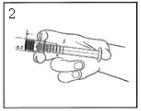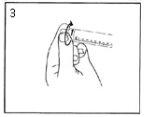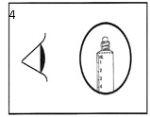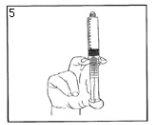
FENILEFRINE AGUETTANT 50 micrograms/mL Injectable Solution in Pre-filled Syringe


How to use FENILEFRINE AGUETTANT 50 micrograms/mL Injectable Solution in Pre-filled Syringe
Translated with AI
This page provides general information and does not replace a doctor’s consultation. Always consult a doctor before taking any medication. Seek urgent medical care if symptoms are severe.
Show originalContents of the leaflet
Introduction
Package Leaflet: Information for the Patient
Fenilefrina Aguettant 50 micrograms/ml solution for injection in pre-filled syringe
(Hereafter referred to as “Fenilefrina injectable”)
Fenilefrina
Read all of this leaflet carefully before you are given this medicine because it contains important information for you.
- Keep this leaflet, you may need to read it again. If you have any further questions, ask your doctor, pharmacist, or nurse.
- If you experience side effects, consult your doctor, pharmacist, or nurse, even if they are not listed in this leaflet. See section 4.
Contents of the package leaflet
- What is Fenilefrina injectable and what is it used for
- What you need to know before you are given Fenilefrina injectable
- How Fenilefrina injectable is administered
- Possible side effects
- Storage of Fenilefrina injectable
- Contents of the pack and further information
1. What is Fenilefrina injectable and what is it used for
This medicine is part of a group of adrenergic and dopaminergic agents.
It is used to treat low blood pressure during anesthesia.
2. What you need to know before you are given Fenilefrina injectable
Fenilefrina injectable will not be administered to you:
- If you are allergic to phenylephrine hydrochloride or any of the other ingredients of this medicine (listed in section 6);
- If you suffer from extremely high blood pressure or peripheral vascular disease (poor circulation);
- If you are taking a monoamine oxidase inhibitor (MAOI) (or in the 2 weeks following its withdrawal), used to treat depression (such as iproniazid, nialamide);
- If you have an overactive thyroid gland (hyperthyroidism).
Warnings and precautions
Consult your doctor, pharmacist, or nurse before starting to use Fenilefrina injectable:
- If you are elderly;
- If you are diabetic;
- If you have high blood pressure;
- If you have an overactive thyroid gland (uncontrolled hyperthyroidism);
- If you have a blood vessel disease, such as arteriosclerosis (hardening and thickening of the walls of the blood vessels);
- If you have poor blood circulation in the brain;
- if you have heart disease, including chronic heart disease, peripheral vascular insufficiency, cardiac rhythm disorders, tachycardia (rapid heart rate), bradycardia (slow heart rate), partial heart block, angina pectoris;
- If you have a rare eye disease (angle-closure glaucoma).
In patients with severe heart failure, phenylephrine could worsen heart failure due to blood vessel constriction.
Your blood pressure will be monitored during treatment. If you have heart disease, additional monitoring of your vital functions will be performed.
Children
The use of this medicine is not recommended in children due to insufficient data on its efficacy, safety, and dosage recommendations.
Using Fenilefrina injectable with other medicines
Tell your doctor if you are using, have recently used, or might use any other medicines, such as:
- certain antidepressants (iproniazid, nialamide, moclobemide, toloxatone, imipramine, milnacipran, or venlafaxine);
- medicines used to treat infections (linezolid);
- certain medicines used to treat migraines (dihydroergotamine, ergotamine, methylergonovine, methysergide);
- certain medicines used to treat Parkinson's disease (bromocriptine, lisuride, pergolide);
- a medicine used to inhibit the production of a hormone responsible for lactation (cabergoline);
- inhalation anesthesia (desflurane, enflurane, halothane, isoflurane, methoxyflurane, sevoflurane);
- medicines used as appetite suppressants (sibutramine);
- medicines used to treat high blood pressure (guanethidine);
- medicines used to treat heart failure and certain arrhythmias (cardiac glycosides);
- medicines used to treat abnormal heart rhythms (quinidine);
- medicines used during childbirth (oxytocin).
Pregnancy and breastfeeding
The safety of this medicine during pregnancy and breastfeeding has not been established, but the use of Fenilefrina injectable is possible during pregnancy if necessary.
The use of this medicine is not recommended during breastfeeding. However, breastfeeding is possible if it is administered once during childbirth.
If you are pregnant or breastfeeding, think you may be pregnant, or plan to become pregnant, consult your doctor, pharmacist, or nurse before using this medicine.
Driving and using machines
Talk to your doctor if you want to drive or use machines after using this medicine.
Fenilefrina injectable contains sodium
This medicine contains 37.2 mg of sodium (a major component of table/cooking salt) per syringe. This is equivalent to 1.9% of the maximum recommended daily sodium intake for an adult.
3. How Fenilefrina injectable is administered
Administration will be performed by a healthcare professional with the appropriate training and experience, who will decide the correct dose for you and when and how the injection should be administered.
Recommended doses are:
Use in adults
Your doctor will determine the dose to be administered and may repeat or adjust it until the desired effect is achieved.
Use in patients with renal insufficiency(poor kidney function)
Lower doses of phenylephrine may be necessary in patients with renal insufficiency.
Use in patients with hepatic insufficiency(poor liver function)
Patients with liver cirrhosis may require higher doses of phenylephrine.
Use in elderly patients
Treatment in elderly patients should be carried out with caution.
Use in children
The use of this medicine is not recommended in children due to insufficient data on its efficacy, safety, and dosage recommendations.
If you have been administered more Fenilefrina injectable than you should:
You may experience the following symptoms: palpitations, cardiac rhythm disorders (tachycardia, cardiac arrhythmias).
For more information about the use of this medicine, consult your doctor, pharmacist, or nurse.
4. Possible side effects
Like all medicines, this medicine can cause side effects, although not everybody gets them.
Some side effects can be serious (frequency not known). Tell your doctor immediately if you experience any of these symptoms:
- Chest pain or pain due to angina;
- Irregular heartbeat;
- Feeling of the heart beating out of the chest;
- Cerebral hemorrhage (speech disorder, dizziness, paralysis of one side of the body);
- Psychosis (loss of contact with reality);
Other side effects may include (frequency not known):
- Hypersensitivity reaction (allergy);
- Excessive pupil dilation;
- Increased eye pressure (worsening of glaucoma);
- Excitability (excessive sensitivity of an organ or body part);
- Agitation (restlessness);
- Anxiety;
- Confusion;
- Headache;
- Nervousness;
- Insomnia (difficulty falling asleep or staying asleep);
- Tremors;
- Skin burning sensation;
- Skin itching;
- Itching or tingling sensation of the skin (paresthesia);
- Slow or rapid heartbeat;
- High blood pressure;
- Breathing difficulties;
- Fluid in the lungs;
- Nausea;
- Vomiting;
- Sweating;
- Pale skin color (pale skin);
- Goosebumps;
- Tissue damage at the injection site;
- Muscle weakness;
- Difficulty urinating or urinary retention.
Reporting of side effects
If you experience any side effects, consult your doctor, pharmacist, or nurse, even if they are not listed in this leaflet. You can also report them directly through the Spanish Medicines Monitoring System: https://www.notificaram.es. By reporting side effects, you can help provide more information on the safety of this medicine.
5. Storage of Fenilefrina injectable
Keep this medicine out of the sight and reach of children.
Do not use this medicine after the expiry date stated on the packaging and on the label of the syringe after EXP. The expiry date is the last day of the month stated.
This medicine does not require any special storage temperature.
Keep the blister pack in the outer packaging to protect it from light. Keep the syringe in the blister pack perfectly closed.
Do not use this medicine if you notice visible signs of deterioration.
Any syringe, even if only partially used, must be discarded after use.
Medicines should not be disposed of via wastewater or household waste. Ask your pharmacist how to dispose of the packaging and any unused medicines. This will help protect the environment.
6. Contents of the pack and further information
Composition of Fenilefrina injectable
The active substance is phenylephrine hydrochloride.
- Each ml of the solution for injection contains phenylephrine hydrochloride, equivalent to 50 micrograms of phenylephrine.
- Each pre-filled syringe of 10 ml contains phenylephrine hydrochloride, equivalent to 500 micrograms of phenylephrine.
- The other ingredients are sodium chloride, sodium citrate, citric acid monohydrate, sodium hydroxide, and water for injections.
Appearance and packaging of the product
Fenilefrina injectable is a clear, colorless solution in a 10 ml pre-filled polypropylene syringe, packaged individually in a transparent blister pack.
The pre-filled syringes are available in packs of 1 and 10 syringes.
Only certain pack sizes may be marketed.
Marketing authorization holder and manufacturer
LABORATOIRE AGUETTANT
1 rue Alexander Fleming, Parc Scientifique Tony Garnier
69007 Lyon- France
Laboratoire AGUETTANT
Lieu-Dit « Chantecaille »
07340 Champagne
France
Local representative:
AGUETTANT IBERICA
C/Pau claris, 139, Pral. 2
08009, Barcelona-Spain
Date of last revision of this leaflet:September 2020
Detailed and up-to-date information on this medicine is available on the website of the Spanish Agency for Medicines and Health Products (AEMPS) http://www.aemps.gob.es/
This information is intended only for healthcare professionals:
Prepare the syringe carefully as follows
The pre-filled syringe is for single patient use. Discard the syringe after use. Do not reuse it.
The contents of an unopened or undamaged blister pack are sterile and should not be opened until the time of use.
The product should be visually inspected to check for particles or color change before administration. The solution should only be used if it is clear, colorless, and free of particles or precipitates.
The product should not be used if the security seal of the syringe is broken.
The outer surface of the syringe is sterile until the blister pack is opened.
When used with an aseptic method, Fenilefrina Aguettant 50 micrograms/ml solution for injection in pre-filled syringe can be placed in a sterile field.
- Remove the pre-filled syringe from the sterile blister pack.
|
|
|
|
|
|
|
|
- Connect the syringe to the intravenous access. Slowly push the plunger to inject the necessary volume.
- Disposal of unused medicine or waste materials should be carried out in accordance with local requirements.
- Country of registration
- Active substance
- Prescription requiredYes
- Manufacturer
- This information is for reference only and does not constitute medical advice. Always consult a doctor before taking any medication. Oladoctor is not responsible for medical decisions based on this content.
- Alternatives to FENILEFRINE AGUETTANT 50 micrograms/mL Injectable Solution in Pre-filled SyringeDosage form: INJECTABLE, 100 micrograms/mlActive substance: phenylephrineManufacturer: Laboratoire AguettantPrescription requiredDosage form: INJECTABLE, 0.1 mg/mlActive substance: phenylephrineManufacturer: Altan Pharmaceuticals SaPrescription requiredDosage form: INJECTABLE, 10 mg/mLActive substance: phenylephrineManufacturer: Altan Pharmaceuticals SaPrescription required
Online doctors for FENILEFRINE AGUETTANT 50 micrograms/mL Injectable Solution in Pre-filled Syringe
Discuss questions about FENILEFRINE AGUETTANT 50 micrograms/mL Injectable Solution in Pre-filled Syringe, including use, safety considerations and prescription review, subject to medical assessment and local regulations.
Frequently Asked Questions















